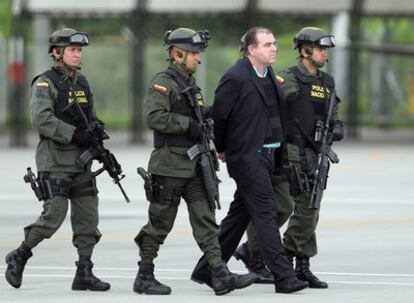Santos gives Chávez the Venezuelan trafficker who implicated his officials
Makled is also wanted by the US but Colombia opts to extradite him to Caracas
After several weeks of delays, Colombian President Juan Manuel Santos kept the promise he made to his Venezuelan counterpart Hugo Chávez, extraditing an alleged drug baron who is also wanted by the US government.
A handcuffed and heavily guarded Walid Makled arrived at Caracas' La Carlota airport on Monday after he was ordered to be transferred from prison in Bogota. Prosecutors say the Syrian-born Makled faces drug-trafficking and murder charges.
Makled, a Venezuelan national, became a political headache for Santos' government, which is trying to patch up relations with Venezuela but at the same time keep Washington happy, as Colombia continues to negotiate its free trade deal with the United States.
Since his arrest last August, Makled, known as "The Turk," has publicly said on several occasions that he moved tons of cocaine through Venezuela with the help of at least 40 military and senior government officials in Chávez's administration. "I worked for eight years with Chávez's government. [...] I worked on many jobs we had together," Makled said in his most recent interview with reporters in Colombia last month.
Chávez called him "a liar" and said the US government was encouraging Makled to "spread false stories."
Several US Republican lawmakers had been pressuring President Obama to push Santos to extradite Makled to Miami, where he was indicted by a federal grand jury. They suggested that he could be essential in cooperating with the US Justice Department in investigating Venezuelan officials long suspected of involvement in drug trafficking.
Santos said that he had already given his word that he would send the trafficker to Venezuela before the United States made its request. But US Justice Department sources have acknowledged that agents from the Drug Enforcement Administration (DEA) interviewed Makled on different occasions in his Bogota jail cell.
Colombia's Criminal Investigation Department (Dijin) arrested Makled on August 19, 2010 in the border city of Cúcuta, where he had taken refuge as a fugitive from Venezuelan justice.
Some Colombian politicians, as well as different sectors of the Venezuelan opposition, criticized Santos' decision, saying that personal interests of the two leaders had undermined justice.
Miguel Ángel Rodríguez, a Venezuelan opposition lawmaker, said that the Makled case had "gargantuan political implications," and demanded that the courts investigate officials who may have helped him in his drug trafficking activities.
Tarek el Aissami, Venezuela's interior and justice minister, described the extradition as "a great victory for Venezuelan justice" and said that it was the result of "good relations with Colombia" that began to normalize last August after a period of tension between the two countries during the government of Álvaro Uribe.
Lawyers for The Turk, have said they would make a series of requests before the courts, including holding a televised trial and placing him in a special prison for his protection.
Venezuelan Attorney General Luisa Ortega Luisa Días said last week that Walid would be immediately taken to court to answer for the murders of journalist Orel Zambrano and veterinarian Francisco Larrazábal, as well as various drug offenses.

Tu suscripción se está usando en otro dispositivo
¿Quieres añadir otro usuario a tu suscripción?
Si continúas leyendo en este dispositivo, no se podrá leer en el otro.
FlechaTu suscripción se está usando en otro dispositivo y solo puedes acceder a EL PAÍS desde un dispositivo a la vez.
Si quieres compartir tu cuenta, cambia tu suscripción a la modalidad Premium, así podrás añadir otro usuario. Cada uno accederá con su propia cuenta de email, lo que os permitirá personalizar vuestra experiencia en EL PAÍS.
¿Tienes una suscripción de empresa? Accede aquí para contratar más cuentas.
En el caso de no saber quién está usando tu cuenta, te recomendamos cambiar tu contraseña aquí.
Si decides continuar compartiendo tu cuenta, este mensaje se mostrará en tu dispositivo y en el de la otra persona que está usando tu cuenta de forma indefinida, afectando a tu experiencia de lectura. Puedes consultar aquí los términos y condiciones de la suscripción digital.








































